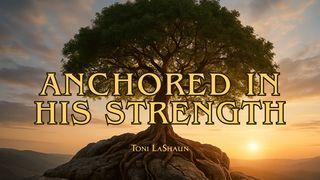Disappointment With God: What to Do When God Feels SilentSample

LIFE WITH GOD MEANS TRUSTING GOD
WHAT WE LEARN ABOUT SARAH
Toward the end of Sarah’s story, we see God keep His promise. After 24 years, Sarah (finally) has the child, just as God said. Abraham and Sarah name the boy Isaac which means “laughter.”
In Genesis 18, Sarah laughed at God when He reiterated His promise that she would have a baby. That was the scoffing laughter of disbelief and cynicism. As in, “HA! Right. Okay. We’ll see.” It was the laughter of, “This is too good to be true,” and “I can’t emotionally take another letdown.” It was the laughter of someone dismissing God to hedge her bets against yet another disappointment.
But the story has changed. Isaac is here. Sarah’s initial laughter of disbelief has turned into something else: pure joy in staring at the embodied expression of God’s faithfulness.
WHAT WE LEARN ABOUT GOD
In this part of the story, we learn what we hope is true: God keeps His word. He’s reliable. He doesn’t lie, trick, manipulate or back out of His promises. This is a big deal.
We also learn from Sarah’s life another truth: What we believe about God – if He’s good or not, or trustworthy or not – will emerge when life falls apart.
What do we believe? Do we trust God?
The Hebrew word used in Abraham and Sarah’s story for “believe” is the Hebrew word aman. In Genesis 15:6, for example, it’s translated in the NIV as “believed.” Traditionally it’s used to describe driving a tent stake into firm ground; but it also means to “fully put one’s trust in something.” This word is used roughly 110 times in the Old Testament.
In a real sense, both Abraham and Sarah – for all their ups and downs - learned to drive the stake of their lives into the ground of God, knowing it would hold.
HOW WE CAN GROW
In his book Mere Christianity, C.S. Lewis defined faith as “the art of holding on to things your reason has once accepted, in spite of your changing moods.”
Our moods change. Sometimes, life makes it easy to believe in God’s goodness; other times, it feels impossible. Walking with God means we must make a decision to trust God even when all the evidence is contrary.
Sarah’s life reminds us not to let the “evidence” of life convince us that God has forgotten us. We should not take matters into our own hands, lest we cause calamity for ourselves and others. We should not SEE/DESIRE/TAKE, but HEAR/TRUST/OBEY.
And it’s a reminder to celebrate with joy, and do what Sarah does in these final verses: Express the greatness, beauty, and goodness of God that we find in our story, and then pass that along to whomever else might need to hear it.
Sarah says in Genesis 21:6 (NIV), “Everyone who hears about this will laugh with me.” And we do, not because Sarah was so steadfast in her belief in God and so faithful to Him; but because in the end, God ended up being trustworthy and good, interacting in human history for the good of the human race, and for the joy of a woman named Sarah.
And that’s cause for real celebration.
REFLECTION QUESTION:
Looking back on Sarah’s journey – from dead ends and desperate waiting, through doubt and cynicism, to joy and fulfillment – where do you see your own story reflected? In what area of your life is God inviting you to trust His timing, His goodness, and His promises more deeply today?
RESOURCE
DISAPPOINTMENT WITH GOD ASSESSMENT + FLOW CHART
We’ve created a resource to help you identify, process, and take practical steps in dealing with disappointment with God. Click HERE for our Disappointment With God Assessment.
Scripture
About this Plan

This five-day devotional explores the story of Sarah and her deep disappointment with God and with her life. It will help you name your pain, confront your doubts, and discover a God who still moves – especially when it feels like He’s forgotten you. This plan is part of the Character Study series by David Tieche and Jon Fortt.
More
We would like to thank David Tieche and Jon Fortt for providing this plan. For more information, please visit their site at Sarah.fortt.com









